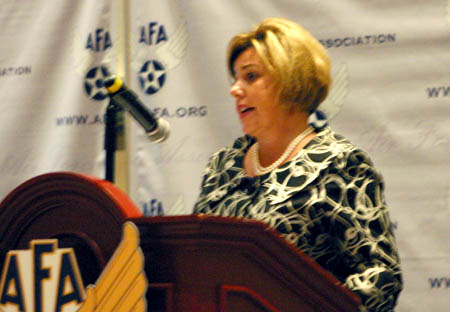 Deputy Undersecretary of the Air Force for International Affairs Heidi Grant said her office is talking with partners and allies around the world about innovative ways to build air capability and capacity. “In some regions, there are huge land forces and, in some countries, we visit with militaries who ask us to talk to [their defense ministries] about airpower,” she told the Daily Report on Sept. 17. These militaries want to find ways to get a conversation going within their countries about how airpower makes their forces more effective, said Grant. In the long term, this will be a huge benefit to US interests, she said. “If I look at what happened in Libya, where did the US have the biggest contribution?” she asked. Those areas were aerial refueling and intelligence, surveillance, and reconnaissance, she said, capabilities that a multinational consortium could perform, much like the Strategic Airlift Capability C-17s that NATO and partner nations operate. Grant said she recently returned from a West African air chiefs conference that included discussions on ISR sharing to deal with cross-border threats. “It’s not something that’s going to happen next year,” she said, but this approach would build capability among allies and aid “operational avoidance” for the United States, which will save the United States money in the long term.
Deputy Undersecretary of the Air Force for International Affairs Heidi Grant said her office is talking with partners and allies around the world about innovative ways to build air capability and capacity. “In some regions, there are huge land forces and, in some countries, we visit with militaries who ask us to talk to [their defense ministries] about airpower,” she told the Daily Report on Sept. 17. These militaries want to find ways to get a conversation going within their countries about how airpower makes their forces more effective, said Grant. In the long term, this will be a huge benefit to US interests, she said. “If I look at what happened in Libya, where did the US have the biggest contribution?” she asked. Those areas were aerial refueling and intelligence, surveillance, and reconnaissance, she said, capabilities that a multinational consortium could perform, much like the Strategic Airlift Capability C-17s that NATO and partner nations operate. Grant said she recently returned from a West African air chiefs conference that included discussions on ISR sharing to deal with cross-border threats. “It’s not something that’s going to happen next year,” she said, but this approach would build capability among allies and aid “operational avoidance” for the United States, which will save the United States money in the long term.
Air Force Gen. Alexus G. Grynkewich assumed command of U.S. European Command on July 1, taking over the key assignment as the U.S. and its allies contend with a resurgent Russia and a grinding war in Ukraine.
